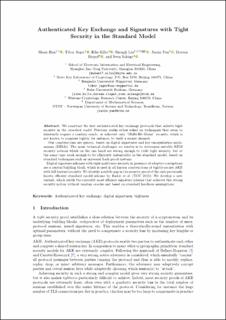Authenticated Key Exchange and Signatures with Tight Security in the Standard Model
| dc.contributor.author | Han, Shuai | |
| dc.contributor.author | Jager, Tibor | |
| dc.contributor.author | Kiltz, Eike | |
| dc.contributor.author | Liu, Shengli | |
| dc.contributor.author | Pan, Jiaxin | |
| dc.contributor.author | Riepel, Doreen | |
| dc.contributor.author | Schäge, Sven | |
| dc.date.accessioned | 2022-05-05T14:03:03Z | |
| dc.date.available | 2022-05-05T14:03:03Z | |
| dc.date.created | 2021-08-26T12:12:25Z | |
| dc.date.issued | 2021 | |
| dc.identifier.issn | 0302-9743 | |
| dc.identifier.uri | https://hdl.handle.net/11250/2994409 | |
| dc.description.abstract | We construct the first authenticated key exchange protocols that achieve tight security in the standard model. Previous works either relied on techniques that seem to inherently require a random oracle, or achieved only “Multi-Bit-Guess” security, which is not known to compose tightly, for instance, to build a secure channel. Our constructions are generic, based on digital signatures and key encapsulation mechanisms (KEMs). The main technical challenges we resolve is to determine suitable KEM security notions which on the one hand are strong enough to yield tight security, but at the same time weak enough to be efficiently instantiable in the standard model, based on standard techniques such as universal hash proof systems. Digital signature schemes with tight multi-user security in presence of adaptive corruptions are a central building block, which is used in all known constructions of tightly-secure AKE with full forward security. We identify a subtle gap in the security proof of the only previously known efficient standard model scheme by Bader et al. (TCC 2015). We develop a new variant, which yields the currently most efficient signature scheme that achieves this strong security notion without random oracles and based on standard hardness assumptions. | en_US |
| dc.language.iso | eng | en_US |
| dc.publisher | Springer | en_US |
| dc.title | Authenticated Key Exchange and Signatures with Tight Security in the Standard Model | en_US |
| dc.type | Peer reviewed | en_US |
| dc.type | Journal article | en_US |
| dc.description.version | acceptedVersion | en_US |
| dc.rights.holder | This is the authors' accepted manuscript to an article published by Springer. Locked until 11/8-2022 due to copyright restrictions. | en_US |
| dc.source.journal | Lecture Notes in Computer Science (LNCS) | en_US |
| dc.identifier.doi | 10.1007/978-3-030-84259-8_23 | |
| dc.identifier.cristin | 1928935 | |
| cristin.ispublished | true | |
| cristin.fulltext | postprint | |
| cristin.qualitycode | 1 |
Tilhørende fil(er)
Denne innførselen finnes i følgende samling(er)
-
Institutt for matematiske fag [2397]
-
Publikasjoner fra CRIStin - NTNU [37703]
